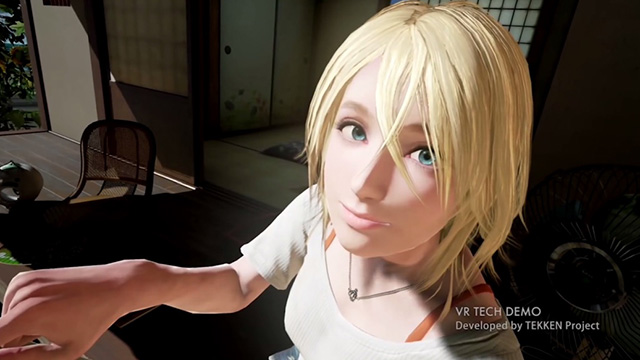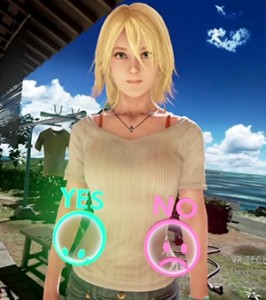The Virtual Waifu: Fad or Future?

Over the course of the past couple of years, I’ve had the opportunity to experience virtual reality gaming a handful of times, as I was able to demo a few games for both the Oculus Rift and Sony’s Project Morpheus at E3 2014 and 2015. To be blunt, I did not find most of the games I demoed to be particularly interesting or exciting. Many of them were short tech demos created for the purpose of showcasing some specific aspect of VR technology, but did not seem suited for development into full-fledged retail releases.
However, a few days prior to my trip to LA for E3 this year, I saw a trailer for one particular VR game for the Morpheus called Summer Lesson that piqued my interest, and I knew I had to try it. Upon my arrival at Sony’s booth, I inquired about scheduling a demo for said game, and was informed that attendees would be randomly assigned one of about 15 demos for the Morpheus. After some skillful negotiations (and by that I mean complaining and threatening to throw a tantrum), I was able demo this game.
Summer Lesson is brought to us by Bandai Namco producer Katsuhiro Harada, who is best known for being the director and chief producer of the fighting game series Tekken. The premise of this short demo is that you are a teacher giving a young English-speaking woman Japanese lessons on a summer day. You sit in a fixed position outside of what appears to be a traditional Japanese house near a beach. Though you only have a limited view of the area due to your fixed position, what can be seen simply beautiful. The view of the exterior of the house, the sunflowers growing in a small garden, the sky, the ocean — all of them are colorful, detailed, and beautifully rendered.
Of course, these things simply provide the setting for the main attraction of the demo. The character with whom you interact with in the demo (whose name was not mentioned in the trailer or demo) is a beautiful blonde young woman. She sports what one could consider fairly common attire for a hot summer day; a t-shirt, jean shorts (Daisy Dukes style), and sandals. Her character model is very well done; clean, colorful, and just overall very visually appealing.

You interact with her through simple head gestures. You can shake or nod your head to indicate a no/yes response to a question. You can lean in for a closer view of something you’re requested to inspect. You can also look around and focus on a particular object, or on an icon for a particular topic you wish to discuss with her. Every action is done via the VR headset in this demo, as there is no controller needed, unlike some other VR demos. Throughout the demo, she asks if she is pronouncing a particular word correctly, asks you to take a closer look at a paper, and asks for help finding her guitar pick (among a few other things) to demonstrate the use of each particular head gesture. I found everything to be straightforward and intuitive — though it did take me a seemingly long time to find that damn guitar pick.
I found this demo to be more immersive than all of the previous demos I tried out. When the female character first comes on screen, it seemed like I could almost “feel” her presence. It was an odd sensation that I cannot really put into words. I felt as if I was there and needed to pay close attention to her. And no, that wasn’t simply due to the fact that she was easy on the eyeballs, though that didn’t hurt. At one point in the demo, I took a few seconds to look away from her and scan the area. “Hey, are you listening to me?” she quipped. Did she notice I wasn’t looking at her? I certainly got that impression, although I suppose it could have been scripted dialogue that occurs no matter what you do. Although I wasn’t prompted for a yes/no response after her question, I felt compelled to nod yes, and did so.
Despite my praise of the immersive quality of this demo, I have to say it left me yearning for even more immersion. When you first try out VR, one of your first reactions will likely be to try to put your hands in front of your face, or reach out for something. You’ll quickly remember that your hands aren’t being tracked by anything, and I feel like that causes us to lose some of that feeling of actually being in the game. The technology certainly exists for hand tracking — Leap Motion for the PC and Xbox’s Kinect are two devices that I would love to see combined with a game of this nature.

Harada has stated that this is still very much a tech demo, and that more characters (including males) and scenarios will be introduced in the future. You may recall that this was not the first demo for Summer Lesson, as the first one featured a Japanese schoolgirl. I’m very excited to see what direction he takes this project in. I haven’t yet mentioned that there are moments in the demo that are, shall I say, somewhat flirtatious. At one point the female character sits beside you, and proceeds to lean over you to get a piece of paper conveniently sitting on the other side of you. At another point, she slowly leans in closely to you, likely to make you wonder if she’s going to kiss you (it turns out she was just reaching for a butterfly that landed on your shoulder). These interactions give the impression that perhaps this project could become some sort of dating sim.
If that is where Summer Lesson is headed, that opens up a whole new conversation — a potentially controversial one. In America, the topic of sexuality is always very controversial, especially so when sexuality is part of a video game. Are we really ready for a full-fledged virtual reality dating sim? The psychology and impact of such a game will certainly create heated debate on the topic. There are some groups of people that will have objections to such a game. Could the potential backlash of this idea cause Harada and Bandai Namco to take this project in another direction, or perhaps scrap it entirely? Only time will tell, and I’m very interested to see how this all unfolds.
The Oculus Rift and Morpheus are both set for a 2016 release. Depending upon how things unfold, next year could be the beginning of the age of the virtual waifu. I, for one, would welcome our new digital overlords.



